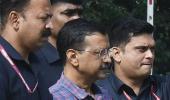A Delhi court on Monday extended till April 23 the judicial custody of Chief Minster Arvind Kejriwal in a money laundering case linked to the alleged excise scam.

Special Judge for the Central Bureau of Investigation and Enforcement Directorate, Kaveri Baweja, extended Kejriwal's custody after he was produced before the court through video-conferencing on the expiry of his period of custody granted earlier.
The ED sought extension of Kejriwal's custody by 14 days, saying the investigation was at a crucial stage.
The judge extended Kejriwal's judicial custody till April 23, noting that the judicial custody of some of the co-accused persons in the case, including BRS leader K Kavitha, is ending on that date.
The court had on April 1 sent Kejriwal to judicial custody till April 15 in the case.
The ED has accused the AAP leader of being involved in the "entire conspiracy of Delhi liquor scam, in drafting and implementation of the policy, for favouring and benefiting from the quid pro, receiving kickbacks and eventually using part of proceeds of crime generated out of the scheduled offence in the campaign for Goa Assembly elections".
Kejriwal on Monday did not get any interim relief from the Supreme Court which sought a response from the Enforcement Directorate by April 24 on his plea challenging his arrest in a money-laundering case stemming from the alleged excise policy scam.
A bench of Justices Sanjiv Khanna and Dipankar Datta issued notice to the ED on Kejriwal's plea challenging the Delhi high court's April 9 order that had upheld his arrest in the case.
The bench said the matter would be heard in the week commencing April 29.
Senior advocate Abhishek Singhvi, appearing for Kejriwal, questioned the timing of his arrest after the model code of conduct for the general elections had come into force and said it was done to disable him from campaigning.
Terming it a "very unusual matter", not just because Kejriwal was a chief minister, Singhvi told the bench that he wanted to show some facts which would "shock" the conscience of the court.
He said a lot of "selective leaks all over the place" was giving everybody a wrong impression.
"I am not aware of selective leaks," Justice Khanna said, adding, "Let a notice be issued."
Solicitor General Tushar Mehta and additional Solicitor General SV Raju, who represented the ED, said the probe agency will file its reply to the petition.
"I am now asking for an extremely short date of Friday for a reason," Singhvi said, underlining the need for the matter to be heard early.
"We will give a reasonable date, a very short date, but not what you are saying. That is not possible," Justice Khanna told Singhvi.
During the hearing, the senior advocate said the CBI and the ED have filed eight chargesheets in the excise case and Kejriwal had not been named in any of them.
"The story starts from September 2022 and he (Kejriwal) is arrested in March 2024," he said. Singhvi said during this period, 15 statements, including nine by one person and six by others, were recorded and none of them named Kejriwal.
"Reserve your arguments for the next date," Justice Khanna told the veteran advocate, who continued to question the timing of the AAP national convenor's arrest. Now, Singhvi said, the first round of polling is going to be held on April 19.
Mehta insisted electioneering cannot be a ground for seeking relief in such matters.
"After we have said issue notice, you should not have even argued," the bench told Singhvi, adding, "We know the facts. We have gone through the paper book. We spent so much time".
The bench, while issuing notice to the ED, asked the central agency to file its reply on or before April 24 and rejoinder, if any, can be submitted by April 27.
The high court had on April 9 upheld Kejriwal's arrest in the money laundering case, saying there was no illegality about it and that the ED was left with "little option" after he skipped repeated summonses and refused to join the investigation.
The matter pertains to alleged corruption and money laundering in the formulation and execution of the Delhi government's excise policy for 2021-22 which was later scrapped.
The ED had arrested Kejriwal on March 21, hours after the high court refused to grant him protection from coercive action by the federal anti-money laundering agency.
He is in currently lodged in Tihar Jail under judicial custody.
Kejriwal has described his arrest ahead of the general elections as an "unprecedented assault on the tenets of democracy" and urged the apex court to release him by declaring the case against him as "illegal".
In his appeal, the Delhi chief minister said his arrest was "obviously motivated by extraneous considerations".
"The intervention of this court is urgently warranted, as over and above the issue of illegal curtailment of liberty, the petitioner's arrest also constitutes an unprecedented assault on the tenets of democracy, free-and-fair elections and federalism, both of which form significant constituents of the basic structure of the Constitution," he has said.
The arrest was made solely relying on "subsequent, contradictory and highly-belated statements" of the co-accused who have now turned approvers, he has said in the appeal.
"The petitioner's arrest bears serious, irreversible ramifications for the future of electoral democracy in India and if he is not released forthwith to participate in the upcoming elections, it will establish a precedence in law for ruling parties to arrest heads of political opposition on flimsy and vexatious charges before elections, thereby eroding the core principles of our Constitution," the plea said.
The high court, it said, failed to appreciate that statements made before a probe agency are not held to be the gospel truth and can always be doubted by the courts.
"The ED has allowed its process to be used and misused by vested interests as an instrument of oppression to not only invade the liberty of the political opponents in the midst of general elections 2024 of such vested interests but also to tarnish their reputation and self-esteem. Such lawlessness cannot be allowed to be perpetrated under any circumstances," Kejriwal has said in his appeal before the top court.











 © 2025
© 2025